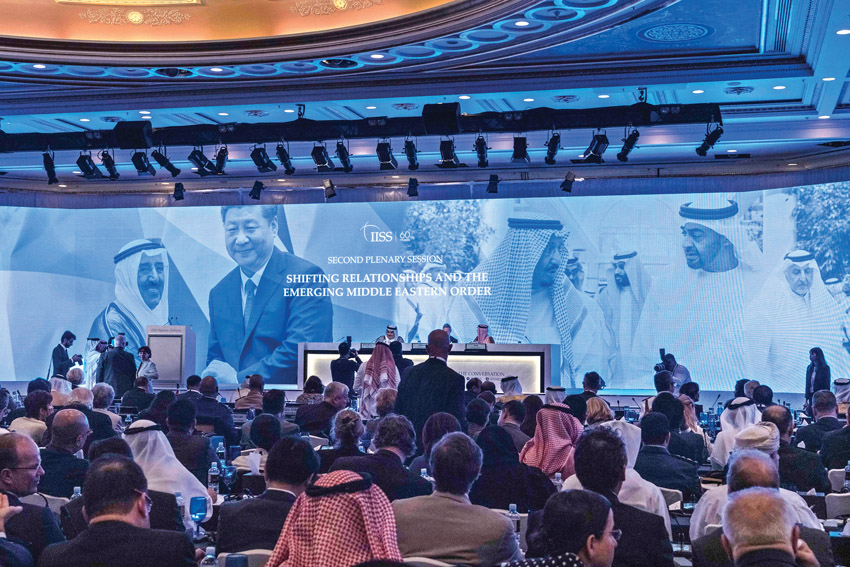MANAMA: If anyone understands the consequences of Iranian involvement in Middle East affairs, David Petraeus does.
Before becoming director of the CIA in 2011, Petraeus was a four-star general with a glittering 37-year in the US military; he has commanded US and coalition forces in both Iraq and Afghanistan, and as head of US Central Command he led all US military operations in Afghanistan, Pakistan, Central Asia, the Arabian Peninsula and Egypt.
Which is why, if anyone is suspicious of attempts to preserve the 2015 deal that was supposed to curb Iran’s nuclear program, and to dilute the effects of US sanctions on Iran — as some European countries would like to do — David Petraeus is.
“The Europeans focused on the strengths of the agreement and would like to continue it,” he says. “I would have some understanding for that, were it not for the fact that I’ve been on battlefields where American, coalition and Iraqi soldiers have been killed by lethal weapons and ammunition provided by Iran, along with funding. “Iran is a country … that pushes until there is firm pushback. I think that you are now seeing an American administration that is willing to push back very firmly. It has, with the additional defense spending and robust economic growth, a stronger foundation from which to push back and renew partnerships with its allies in the Gulf.”
Petraeus, now chairman of the KKR Global Institute, is a key speaker at the Manama Dialogue, the annual security conference in Bahrain organized by the International Institute for Strategic Studies. As the Nov. 4 deadline draws near for the reimposition of US sanctions on Iran’s energy sector, including its crucial oil trade, Iranian influence and its threat to the region was a major focus of the conference.
Petraeus says: “Iran has continued its support for lethal activities in Lebanon, Syria, Iraq, Yemen and other places. It has continued the threatening missile program developments and a variety of different activities that indicated it did not want to take advantage of the opportunity that it had to capitalize on this nuclear deal.
“Will they continue their destabilizing activity? I think they will for some time, but at a certain point they’ll realize that this is a different administration that is going to be unyielding in its position on these sanctions. It may then be willing to come back to the table and recognize that it cannot get away with what is clearly unacceptable activities in the region and in the eyes of the rest of the world.
“In truth, Iran wants to ‘Lebanonize’ not just Lebanon, but Iraq, perhaps Syria, and other countries.”
Petraeus says there is ample evidence that Iran has armed, trained, funded and equipped powerful militias on the streets to give it clout on the ground. That becomes clear when some members of these militias are represented in their countries’ parliaments, as has happened in Lebanon and to some degree in Iraq.
Addressing the conference on Saturday, Saudi Foreign Minister Adel Al-Jubeir referred to the 12 demands that the US has made of Iran before normal relations can be considered, demands that were laid out by US Secretary of State Mike Pompeo in May.

The second plenary session of Manama Dialogue conference in Bahrain on Saturday.
Petraeus, of course, knows Al-Jubeir well from the minister’s time as the Saudi Ambassador to the US from 2007 to 2015. “I have enormous respect for the Foreign Minister Adel Al-Jubeir, as I worked with him very closely when he was the ambassador,” he says.
“He was one of a less than a handful of ambassadors who could come and see me in the CIA at any time, and I would always speak with him. Always, it was a guarantee.”
Petraeus believes Saudi Arabia will play a major and pivotal role once the new US sanctions on Iranian oil take effect. He believes the Kingdom must bring its own additional capacity online to stabilize the market, as it has pledged to do.
Though Iran does play a major role in creating chaos and instability in the region, Petraeus believes it has become a common denominator in the region’s relationships with other countries in the world.
“I think Iran is the unifying force in the Gulf,” he says. “It has done something no other activity or interest could do — it has brought together just about all the countries in the region, and frankly it has led to an improvement in the relationship between Gulf states and Israel.
“It’s not a formal relationship, there’s no diplomatic recognition yet, but the ‘enemy of my enemy is my friend’ — except in Syria where it’s not necessarily the case, one reason why that is such a complex situation.”























